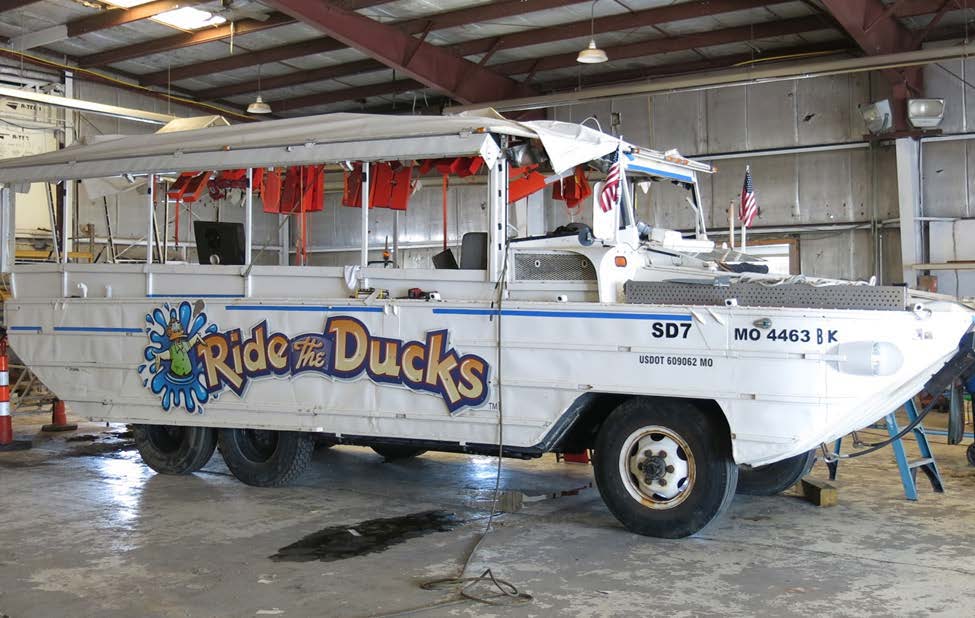WASHINGTON (April 28, 2020) — The National Transportation Safety Board said during a public board meeting Tuesday, the continued operation of amphibious passenger vessel Stretch Duck 7 during severe weather led to the fatal, July 19, 2018, sinking of the vessel on Table Rock Lake, Missouri.
The 33-foot-long, modified, World War II-era DUKW amphibious passenger vessel, operated by Ripley Entertainment Inc., dba Ride The Ducks of Branson, sank during a derecho on Table Rock Lake near Branson, Missouri. The vessel had 29 passengers and two crewmembers aboard for a tour. One crewmember and 16 passengers died in the accident.
Ride the Ducks of Branson continued to operate waterborne tours after a severe thunderstorm warning had been issued. This exposed the vessel to a derecho, which resulted in waves flooding through a non-weathertight air intake hatch on the bow, which caused the vessel to sink, the NTSB determined.
Contributing to the duck boat’s sinking was the U.S. Coast Guard’s failure to require sufficient reserve buoyancy in amphibious vessels. NTSB investigators found that the accident vessel was originally constructed with a low freeboard, an open hull, and no subdivision or flotation, resulting in a design without adequate reserve buoyancy. Additionally, the NTSB cited previous inaction to address emergency egress on amphibious passenger vessels with fixed canopies which impeded passenger escape from the Stretch Duck 7.
Tuesday’s board meeting was held virtually due to the COVID-19 restrictions on public gatherings. The proceedings were also webcast, a standard procedure for all board meetings.
“Had Ride The Ducks employees taken more appropriate actions and made better decisions, it is likely the duck boat would not have sunk, because they would not have continued operations based on the weather forecast and prevailing conditions,” said NTSB Chairman Robert Sumwalt.

(The Stretch Duck 7, a modified WWII DUKW amphibious passenger vessel, shown in this July 25, 2018, photo after it was recovered from Table Rock Lake near Branson Missouri. The vessel sank during a storm July 19, 2018.
NTSB Photo by Brian Young)
In their investigation, NTSB investigators documented that the National Weather Service had issued a severe thunderstorm watch for the area, several hours before the sinking. That watch was followed by a severe thunderstorm warning 1 minute before Stretch Duck 7 departed the shoreside boarding facility about 6 miles from the lake where the tours began and ended. Investigators noted three other company vessels also entered the lake after the severe thunderstorm warning was issued.
The NTSB said the fixed canopy of the Stretch Duck 7 contributed to the severity of the accident as the canopy’s design impeded passenger egress as the vessel took on water and sank. When the vessel sank, the closed starboard-side curtain aboard the vessel impeded the passengers’ escape and likely resulted in additional fatalities, the NTSB concluded.
The NTSB issued six safety recommendations with three recommendations issued to the Ripley Entertainment Inc. dba Ride The Ducks and three recommendations to the US Coast Guard. These recommendations address safety issues including company oversight, engine compartment ventilation closures, reserve buoyancy, survivability, weather training for mariners, and Coast Guard guidance.
The NTSB issued two safety recommendations Nov. 13, Nov. 13, 2019, calling for sufficient reserve buoyancy and improved emergency egress on DUKW amphibious passenger vessels.Nov. 13, Nov. 13, 2019, calling for sufficient reserve buoyancy and improved emergency egress on DUKW amphibious passenger vessels.
An abstract of the NTSB’s final report, which includes the findings, probable cause, and all safety recommendations, is available at https://go.usa.gov/xvEzG.
The final report for the investigation is expected to be published in the next few weeks.
Links to the accident docket and related news releases for this investigation are available at https://go.usa.gov/xvTSs.
To report an incident/accident or if you are a public safety agency, please call 1-844-373-9922 or 202-314-6290 to speak to a Watch Officer at the NTSB Response Operations Center (ROC) in Washington, DC (24/7).